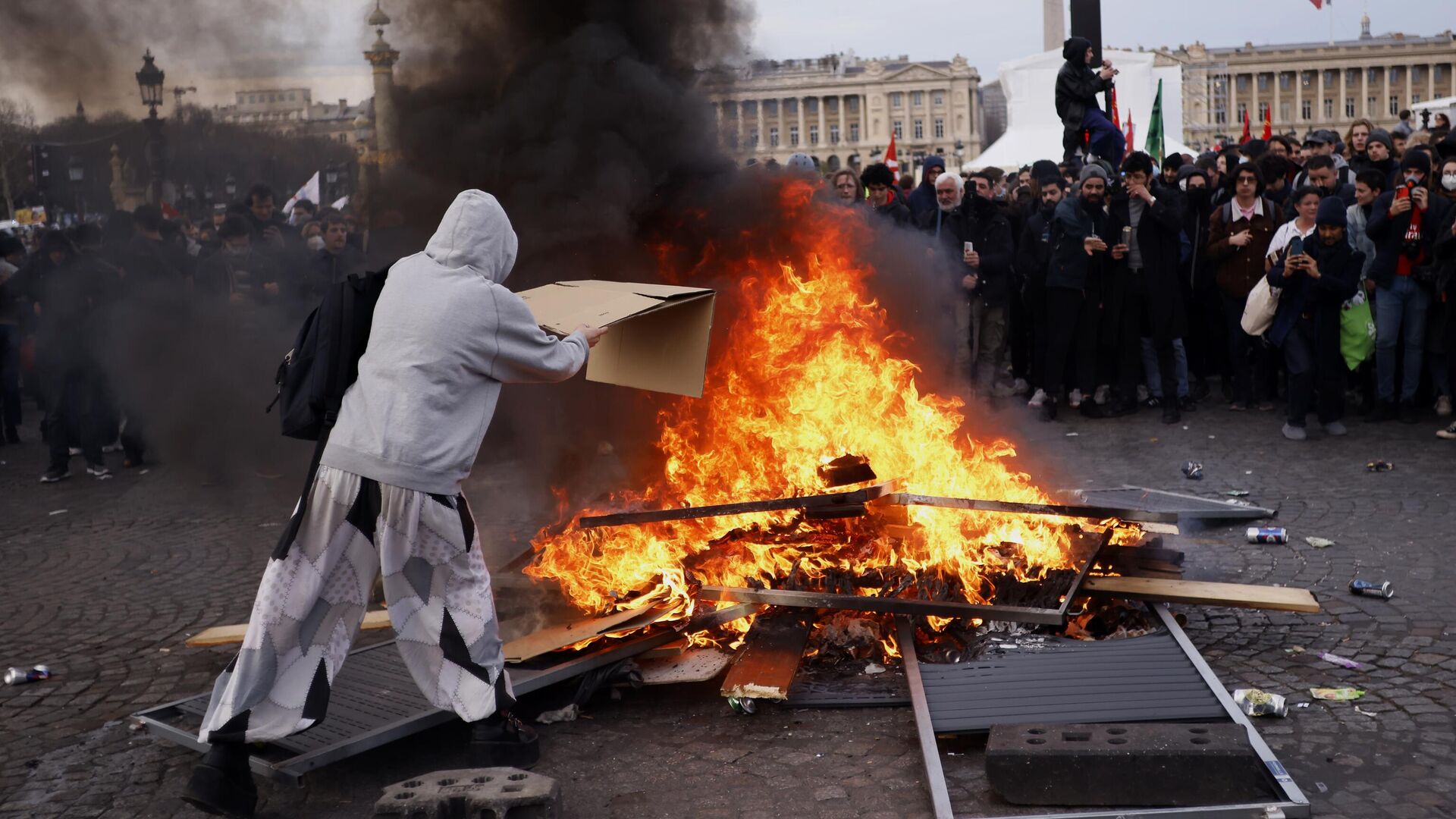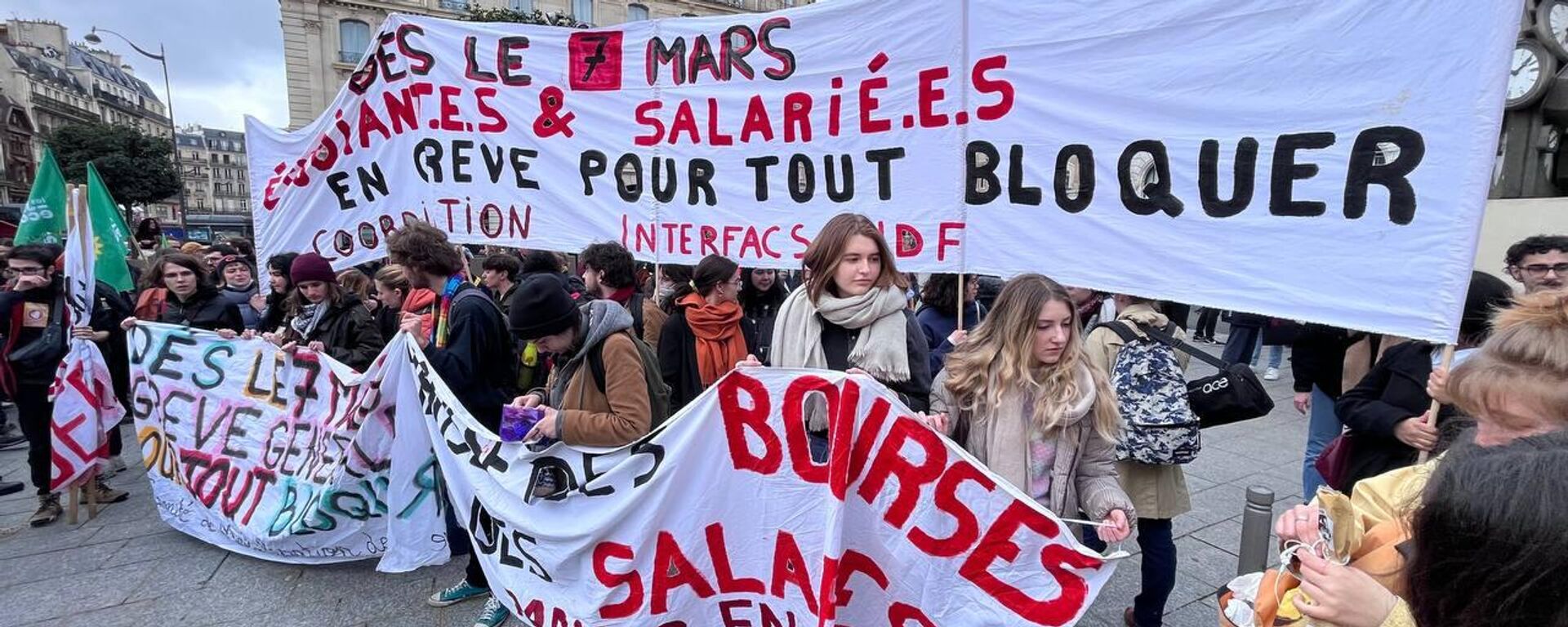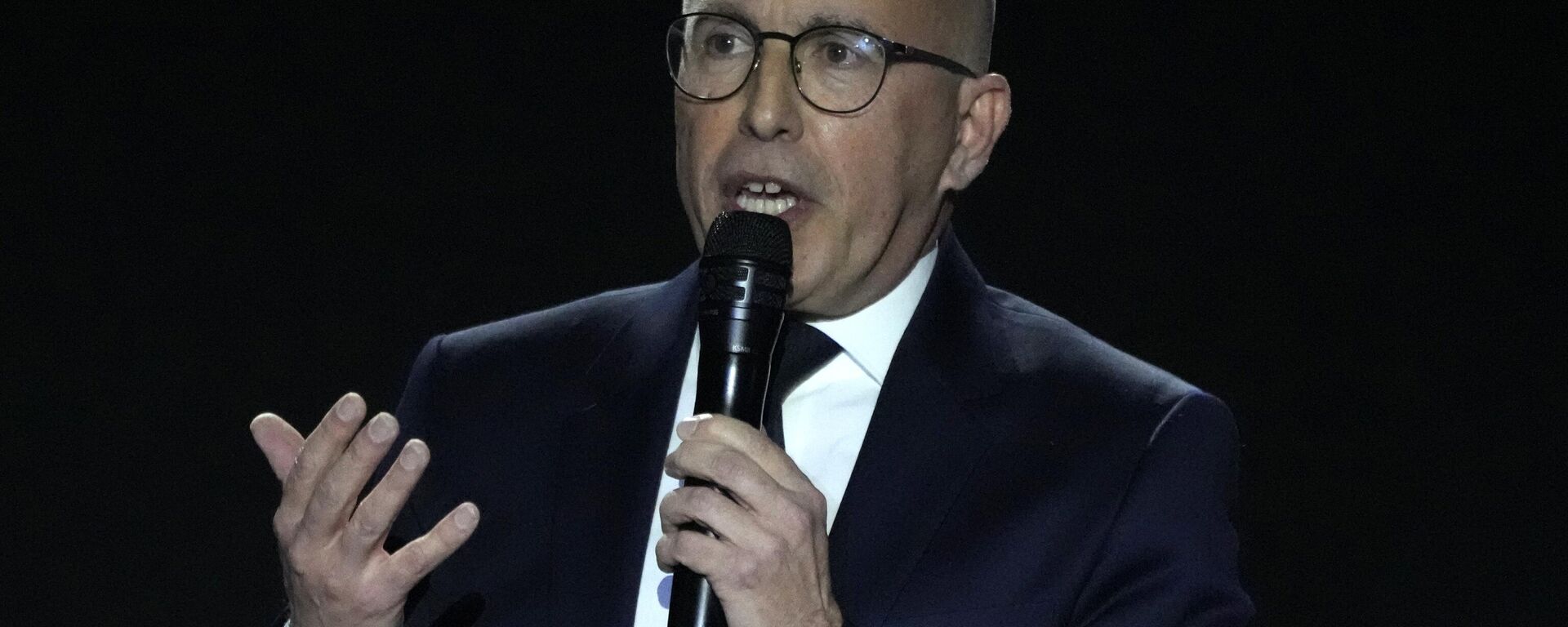https://sputnikglobe.com/20230317/job-walkouts-mass-rallies--fiery-rhetoric-what-are-the-nationwide-french-protests-about-1108499942.html
Job Walkouts, Mass Rallies & Fiery Rhetoric: What Are the Nationwide French Protests About?
Job Walkouts, Mass Rallies & Fiery Rhetoric: What Are the Nationwide French Protests About?
Sputnik International
A look at what is fueling the nationwide French protests.
2023-03-17T13:25+0000
2023-03-17T13:25+0000
2023-03-17T13:25+0000
france
mass protests
pension reform
emmanuel macron
world
marine le pen
olivier faure
eric ciotti
cost of living
ukraine crisis
https://cdn1.img.sputnikglobe.com/img/07e7/03/11/1108496553_0:161:3070:1888_1920x0_80_0_0_20752f7d44065c7839d9dfb870335e76.jpg
Almost 300 protesters were reportedly detained in Paris on March 16 as police resorted to tear gas and water cannon to crack down on those rallying outside parliament after President Emmanuel Macron's controversial pension reform bill was adopted. The legislation has been fueling protests for months, and now that Macron has successfully wielded a constitutional workaround to get his way, critics of the bill have vowed they will not remain silent.Here is a look at what is fueling the months-long, nationwide spate of vigorous protests across France.Who Has Been Protesting in France?Since the start of the year, France has seen some of the biggest demonstrations in decades. A single day, January 19, witnessed over a million protesting people take to the streets of cities amid France's "Day of Rage," with halted trains, plane flights impacted, and the Paris subway disrupted. Some protests in Paris turned violent, with stones, bottles, flares, and firecrackers lobbed at police. Crowds were subsequently pushed back with the use of tear gas.Demonstrations against Macron's much-touted pension legislation raged on for weeks after, culminating in the events on March 7. On that day, an estimated 1.28 million people turned out, fiercely opposing the government's plans to overhaul the pension reform. All of the trade unions joined forces, including the country's largest – the General Confederation of Labor (Confédération Générale du Travail – CGT), bringing out into the streets public sector workers, people engaged in the transport and energy sectors, dockworkers, teachers, and even museum staff, who all agreed to walkouts. Even a rubbish-collection strike resulted in over 7,000 tons of waste conspicuously strewn across Paris. Why Are People Protesting in France?From February's rallies against the US-spearheaded push to maintain the supply of weapons to Ukraine – and thereby dangerously fueling the crisis there – to railing against the cost of living crisis which started to make itself felt last year, people across France have unfailingly taken to the streets to voice their discontent.However, more recently, the contentious pension reform is what has got the people up in arms, prompting them to lambast the government of President Emmanuel Macron. Opinion polls have showed that two-thirds of French people were opposed to the pension changes, wholeheartedly supporting the protest movement sweeping the country.What is the French Pension Reform Bill?The pension reform is the brainchild of Emmanuel Macron, who originally came up with it in 2017, when he was first elected. Macron's government has underscored the need to "bring into alignment" the existing multiple private sector and public sector pension schemes. Gradually raising the minimum retirement age was at the heart of the proposed overhaul. However, the plans were put on the backburner after they triggered waves of protests in 2020. The idea is to raise the retirement age from 62 to 64. Furthermore, the number of years you need to work to have a full pension would be progressively increased, and quicker than before: 43 years instead of 41.5 by 2027 instead of 2034.However, at the time, over 30 unions launched industrial action, erupting into what became the longest period of strikes in the country since events of May 1968. The protesters wanted the Macron government to ditch a plan to replace France's 42 separate pension regimes with a universal points-based system that would make the official retirement age of 62 obligatory for all workers and envisage it being raised to 64. The COVID pandemic prompted Macron to shelve the reform in 2020. However, the plan was returned to with fresh ardor.What is the Gov't Saying?The French government has been intent on pushing the bill, regardless of protests, citing the future of the entire pension system. Macron and his PM, Elisabeth Borne, have underscored that the headline age limit of 64 was "non-negotiable," insisting that it's the only way to lift France’s pensions system out of deficit by 2030. The French PM stressed the need to "maintain a balance" between the ratio of working citizens and growing number of pensioners in the country. According to media-cited data, from four workers per one retiree about 50 years ago, now there is approximately 1.7 per retiree today. There have been warnings that the trend is set to continue.If the French government hopes to "balance the books" without stooping to tax hikes and slashing pensions, all options "include raising the retirement age," government spokesman Olivier Veran told media in January.What Are Critics of the Pension Bill Arguing?"Macron wants us to die on the job," is what people flooding the streets in protest have been insisting. One crucial criticism of the reform is that it penalizes low-income people with physically demanding, manual jobs, as they will find it more challenging to work for longer. Trade unions warned that the overhaul would hit these people particularly hard, as they tend to start their careers early, while higher education graduates would be less affected by the changes.Another thing that critics of the reform pointed out is that people in manual jobs tend to have lower incomes. As the latter has been linked to a lower life expectancy, retiring at 64 could mean these individuals may, potentially, have less years left to enjoy their retirement.There have been claims that women taking career breaks because of having children may be disproportionately affected by the overhaul too, resulting in them taking longer to reach the required number of pension contributions. In other words, people fear that the reform will result in them being "forced to work up until death.”How Did Macron Bypass Protests Over Reform?As protests mounted and critics relentlessly lashed out at the planned bill, Emmanuel Macron, who does not have a majority in the National Assembly (the lower house), came up with a way to dodge further hardships. After his pension plans passed France’s Senate on Thursday morning, and were scheduled for a vote in the National Assembly, instead, Prime Minister Elisabeth Borne announced that the government would trigger Article 49.3 of the French Constitution.The Assembly session was stopped, and to the strains of the French national anthem “La Marseillaise” sung by fuming lawmakers, French Prime Minister Elisabeth Borne stated:"We will not take the risk of many hours of debate, we will not risk the future of our pension system. This reform is necessary. I am committed to our social model, and this reform is the result of a compromise that the legislators of both houses of Parliament agreed to. I'm ready to take responsibility for it. According to article 49.3 of the Constitution, the government assumes the responsibility for this law."How Have Critics Responded?Emmanuel Macron's use of a constitutional power enabling the government to bypass lawmakers swiftly met with backlash from critics."It's a total failure for the government," said Marine Le pen, leader of France's right-wing political party National Rally. Urging PM Borne to resign, she added: "From the beginning the government fooled itself into thinking it had a majority." Le Pen went on Twitter to call out the PM for having given the French people "a slap."The Socialists have also criticized the bill, with Senator Monique Lubin telling Labor Minister Olivier Dussopt: "Your name will forever be attached to a reform that will set the clock back almost 40 years."Eric Ciotti, leader of French liberal-conservative party The Republicans, said on Thursday that the way the pension reform bill was pushed through without a vote in parliament was a signal that France was experiencing a crisis of democracy.The pension reform text had no parliamentary legitimacy, according to far-left politician Jean-Luc Melenchon, as it was passed "only by the Senate, neither by the mass of French people, nor by the National Assembly, nor by the unions, nor by the workers' associations: it is a text which has no legitimacy." As for further protests and strikes, Philippe Martinez, head of the CGT union, told media that the move by Emmanuel Macron's government "will on the contrary reinvigorate the protest movement, the strikes.”
https://sputnikglobe.com/20230308/french-trade-unions-vow-to-keep-cutting-off-electricity-to-thwart-pension-reform-1108186199.html
https://sputnikglobe.com/20230311/just-in---frances-senate-passes-controversial-pension-reform--1108300516.html
https://sputnikglobe.com/20230316/leader-of-frances-the-republicans-party-says-democracy-in-country-experiencing-crisis-1108484530.html
france
Sputnik International
feedback@sputniknews.com
+74956456601
MIA „Rossiya Segodnya“
2023
News
en_EN
Sputnik International
feedback@sputniknews.com
+74956456601
MIA „Rossiya Segodnya“
Sputnik International
feedback@sputniknews.com
+74956456601
MIA „Rossiya Segodnya“
nationwide french protests, vehement protests across france, french pension reform bill, raising the minimum retirement age, raise the retirement age from 62 to 64, penalises low-income people with physically demanding, manual jobs, constitutional power, emmanuel macron's controversial pension reform bill, article 49.3 of the constitution, enabling the government to bypass lawmakers, total failure for the government,
nationwide french protests, vehement protests across france, french pension reform bill, raising the minimum retirement age, raise the retirement age from 62 to 64, penalises low-income people with physically demanding, manual jobs, constitutional power, emmanuel macron's controversial pension reform bill, article 49.3 of the constitution, enabling the government to bypass lawmakers, total failure for the government,
Job Walkouts, Mass Rallies & Fiery Rhetoric: What Are the Nationwide French Protests About?
Despite mass protests across the country, and just ahead of a final vote in France's lower house of parliament on the text of the controversial pension overhaul bill, French President Emmanuel Macron resorted to special constitutional powers on March 16, as his government pushed through a law raising the retirement age.
Almost 300 protesters were reportedly
detained in Paris on March 16 as police resorted to tear gas and water cannon to crack down on those rallying outside parliament after President Emmanuel Macron's
controversial pension reform bill was adopted. The legislation has been fueling protests for months, and now that Macron has successfully wielded a constitutional workaround to get his way, critics of the bill have vowed they will not remain silent.
Here is a look at what is fueling the months-long, nationwide spate of vigorous protests across France.
Who Has Been Protesting in France?
Since the start of the year, France has seen some of the biggest demonstrations in decades. A single day, January 19, witnessed over
a million protesting people take to the streets of cities amid
France's "Day of Rage," with halted trains, plane flights impacted, and the Paris subway disrupted. Some protests in Paris turned violent, with stones, bottles, flares, and firecrackers lobbed at police. Crowds were subsequently pushed back with the use of tear gas.
Demonstrations against Macron's much-touted pension legislation raged on for weeks after, culminating in the events on March 7. On that day, an estimated 1.28 million people turned out, fiercely opposing the government's plans to overhaul the pension reform. All of the trade unions joined forces, including the country's largest – the General Confederation of Labor (Confédération Générale du Travail – CGT), bringing out into the streets public sector workers, people engaged in the transport and energy sectors, dockworkers, teachers, and even museum staff, who all agreed to walkouts. Even a rubbish-collection strike resulted in over 7,000 tons of waste conspicuously strewn across Paris.
Why Are People Protesting in France?
From February's rallies against the US-spearheaded push to maintain the
supply of weapons to Ukraine – and thereby dangerously fueling the crisis there – to railing against the
cost of living crisis which started to make itself felt last year, people across France have unfailingly taken to the streets to voice their discontent.
However, more recently, the contentious
pension reform is what has got the people up in arms, prompting them to lambast the government of President Emmanuel Macron. Opinion polls have showed that two-thirds of French people were opposed to the pension changes, wholeheartedly supporting the protest movement sweeping the country.
What is the French Pension Reform Bill?
The pension reform is the brainchild of Emmanuel Macron, who originally came up with it in 2017, when he was first elected. Macron's government has underscored the need to "bring into alignment" the existing multiple private sector and public sector pension schemes. Gradually raising the minimum retirement age was at the heart of the proposed overhaul. However, the plans were put on the backburner after they triggered waves of protests in 2020. The idea is to raise the retirement age from 62 to 64. Furthermore, the number of years you need to work to have a full pension would be progressively increased, and quicker than before: 43 years instead of 41.5 by 2027 instead of 2034.
However, at the time, over 30 unions launched industrial action, erupting into
what became the longest period of strikes in the country since events of May 1968. The protesters wanted the Macron government to ditch a plan to replace France's 42 separate pension regimes with a universal points-based system that would make the official retirement age of 62 obligatory for all workers and envisage it being raised to 64. The COVID pandemic prompted Macron to shelve the reform in 2020. However, the plan was returned to with fresh ardor.
"Starting from September 1, 2023, the official retirement age will be gradually increased by 3 months per year to reach 64 years by 2030. At the end of the five-year presidential term [of President Emmanuel Macron] it will be 63 years and 3 months," French Prime Minister Elisabeth Borne said when presenting the draft pension reform in January, 2023.
What is the Gov't Saying?
The French government has been intent on pushing the bill, regardless of protests, citing the future of the entire pension system.
"If we don't enact these reforms, the current system is in danger," Macron warned in December, adding that the new plans would ensure that France’s pension system remains financially viable for "decades to come."
Macron and his PM, Elisabeth Borne, have underscored that the headline age limit of 64 was "non-negotiable," insisting that it's the only way to lift France’s pensions system out of deficit by 2030. The French PM stressed the need to "maintain a balance" between the ratio of working citizens and growing number of pensioners in the country. According to media-cited data, from four workers per one retiree about 50 years ago, now there is approximately 1.7 per retiree today. There have been warnings that the trend is set to continue.
If the French government hopes to "balance the books" without stooping to tax hikes and slashing pensions, all options "include raising the retirement age," government spokesman Olivier Veran told media in January.
What Are Critics of the Pension Bill Arguing?
"Macron wants us to die on the job," is what people flooding the streets in protest have been insisting. One crucial criticism of the reform is that it penalizes low-income people with physically demanding, manual jobs, as they will find it more challenging to work for longer. Trade unions warned that the overhaul would hit these people particularly hard, as they tend to start their careers early, while higher education graduates would be less affected by the changes.
Another thing that critics of the reform pointed out is that people in manual jobs tend to have lower incomes. As the latter has been linked to a lower life expectancy, retiring at 64 could mean these individuals may, potentially, have less years left to enjoy their retirement.
There have been claims that women taking career breaks because of having children may be disproportionately affected by the overhaul too, resulting in them taking longer to reach the required number of pension contributions. In other words, people fear that the reform will result in them being "forced to work up until death.”
How Did Macron Bypass Protests Over Reform?
As protests mounted and critics relentlessly lashed out at the planned bill, Emmanuel Macron, who does not have a majority in the National Assembly (the lower house), came up with a way to dodge further hardships. After his pension plans passed France’s Senate on Thursday morning, and were scheduled for a vote in the National Assembly, instead, Prime Minister Elisabeth Borne announced that the government would trigger Article 49.3 of the French Constitution.
The Assembly session was stopped, and to the strains of the French national anthem “La Marseillaise” sung by fuming lawmakers, French Prime Minister Elisabeth Borne stated:
"We will not take the risk of many hours of debate, we will not risk the future of our pension system. This reform is necessary. I am committed to our social model, and this reform is the result of a compromise that the legislators of both houses of Parliament agreed to. I'm ready to take responsibility for it. According to article 49.3 of the Constitution, the government assumes the responsibility for this law."
How Have Critics Responded?
Emmanuel Macron's use of a constitutional power enabling the government to bypass lawmakers swiftly met with backlash from critics.
"It's a total failure for the government," said Marine Le pen, leader of France's right-wing political party National Rally. Urging PM Borne to resign, she added: "From the beginning the government fooled itself into thinking it had a majority." Le Pen went on Twitter to call out the PM for having given the French people "a slap."
“After the slap that the Prime Minister just gave the French people, by imposing a reform which they do not want, I think that Elisabeth Borne should go,” Le Pen tweeted.
The Socialists have also criticized the bill, with Senator Monique Lubin telling Labor Minister Olivier Dussopt: "Your name will forever be attached to a reform that will set the clock back almost 40 years."
Eric Ciotti, leader of French liberal-conservative party The Republicans, said on Thursday that the way the pension reform bill was pushed through without a vote in parliament was a signal that France was experiencing
a crisis of democracy.The pension reform text had no parliamentary legitimacy, according to far-left politician Jean-Luc Melenchon, as it was passed "only by the Senate, neither by the mass of French people, nor by the National Assembly, nor by the unions, nor by the workers' associations: it is a text which has no legitimacy."
"This government is not worthy of our Fifth Republic, of French democracy," Fabien Roussel, head of the French Communist Party, was cited as saying, while Socialist Party chief Olivier Faure added that, "When a president has no majority in the country, no majority in the National Assembly, he must withdraw his bill."
As for further protests and strikes, Philippe Martinez, head of the CGT union, told media that the move by Emmanuel Macron's government "will on the contrary reinvigorate the protest movement, the strikes.”







